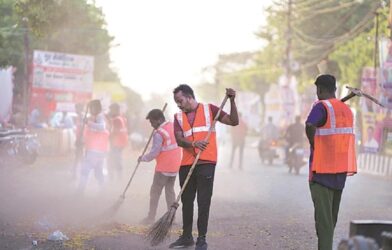The persistent spirit of societal service has always been intricately woven into India’s fabric, from ancient customs to contemporary enterprise. Today, charity is a potent driver for social and economic advancement, driven by progressive regulatory reforms and more transparency. This dedication to making a good effect is now ingrained in company operations and is influencing stakeholder expectations more and more. Our mission at L&T Finance Ltd (LTF) goes beyond business.
We are dedicated to supporting India’s path towards sustainable progress as a reliable partner. Digital and financial inclusion, climate impact management, disaster management, and social inclusion are the main focusses of our corporate social responsibility (CSR) approach. We think that the results of these interventions can lead to greater social impact, scalability, and sustainability. Strong governance procedures have also been incorporated to guarantee that our initiatives continue to be community-led, responsible, and successful. Our CSR efforts have been anchored on the Digital Sakhi programme, which expanded its scope in 2024–2025.
By teaching rural women digital and financial literacy, this programme empowers them to become independent and forge their own identities in society, in addition to being change agents in their communities.Over time, more than 14.20 lakh people of the community—including more than 7.50 lakh rural women—were prepared to use formal banking channels, carry out secure cashless transactions, and assist others in embracing digital payments. More than 2.40 lakh families have benefited greatly from these Sakhis’ assistance in accessing government welfare programmes valued at Rs. 180 crore, improving their money management, and starting or growing more than 10,500 rural women-led microbusinesses.
Financial literacy has had remarkable knock-on consequences, including increased household savings, stronger local economies, and a jump in the number of women-led businesses among more than 5,000 companies.For smallholder farmers in particular, it continues to be one of the biggest threats facing rural India. Our CSR initiatives in 2024–2025 were centred on planting more than 1 lakh saplings and encouraging climate-resilient horticulture on more than 550 acres of land.
We provided instruction in soil health management and micro-irrigation to more than 5000 farmers under Project Prakruti. With the construction and restoration of 58 water conservation structures under Jalvaibhav 2.0, 500 acres of land were benefited, an extra 40,000 kilolitres of water harvesting capacity was created, groundwater recharge was increased, and dependable irrigation was made possible. We remained dedicated to catastrophe management, giving equal weight to readiness and response. In the wake of floods, cyclones, and other natural catastrophes in 2024–2025, we sent quick assistance kits to almost 1.30 lakh people.
Our CSR strategy is primarily motivated by a strong dedication to diversity, making sure that no one is left behind. In 2024–2025, we implemented a pilot project in banking and financial services for youngsters without jobs as part of our social inclusion activities. Due to the successful completion of this pilot project, 66 men and 134 women completed the “Banking and Finance – Operation & Sales” course and were employed in banks and non-banking financial institutions.As Chief Sustainability Officer, one of the values I cherish most is openness and community involvement in government. We reaffirmed this in 2024–2025 using a variety of platforms, including Community Feedback Systems. To get the opinions of those we serve, we held frequent field meetings and surveys.
Through Community Advisory Panels, we convened teachers, Self-Help Group representatives, local leaders, and other interested parties to assess progress, offer suggestions, and guarantee alignment with community interests. Workshops at the state, district, and district levels brought together government representatives, non-governmental organisations, members of the community, and our CSR teams to exchange knowledge, form alliances, and commemorate accomplishments.In addition to raising the calibre of our interventions, these governance structures increased our CSR programmes’ visibility, trust, and sense of local ownership.















Comments are closed